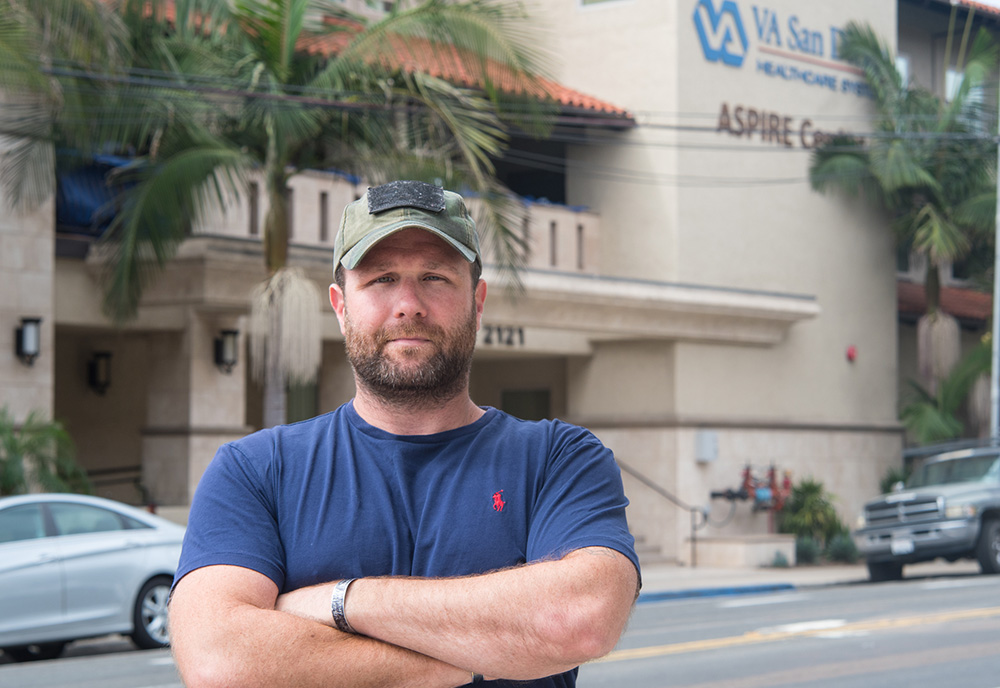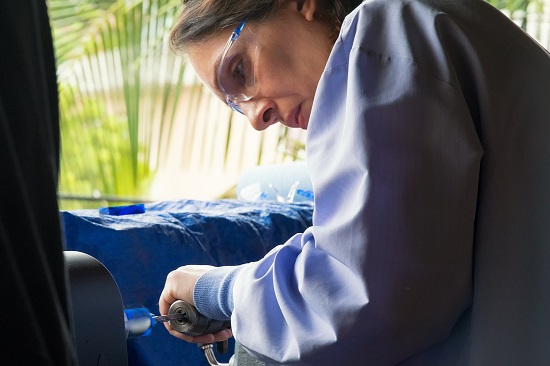Veterans Health Administration
ASPIRE Center Helps Veterans Get Their Life Back

Veteran Brandon Thompson at the Aspire Center in San Diego
As an Army Veteran of over six years with deployments to Iraq, Brandon Thompson tackled life like he conducted himself on the job: emotionless, with his problems tucked away to be dealt with privately. It was a personal mantra that served him well in uniform, but not so much when he honorably separated.
“I tended to push people away including my daughter, my girlfriend and my family because I saw myself in such a negative light,” said Thompson of his life after military service. “I wanted to be alone.”
As problems mounted, Brandon’s emotionless demeanor and aversion to others made him deeply concerned about his relationship with his daughter. He first attempted to find help through a six-week treatment program in Arkansas. In his short amount of time there, Brandon left with an understanding of his feelings, but with no tools to manage his life moving forward.
“I wondered how I can shift my self-destructive behavior into something more positive,” said Brandon. “I’m an alcoholic and I wouldn’t know how to process these feelings so I would drink to help me deal with it. Even going sober through the rehabilitation program, I didn’t have the answers I was seeking, which led me to the Aspire Center. I was ready for it.”
“I’m getting to a place where I can be present in the things that matter to her.”
VA’s Aspire Center, located in San Diego, Calif., is a 40-bed, 30,000 square-foot facility aimed at promoting recovery in Veterans returning from wars in Iraq and Afghanistan. The center provides temporary housing and comprehensive interdisciplinary care including: psychiatry, psychology, addiction therapy, onsite primary care and nursing support, spirituality, social work services, recreational activities, financial counseling, vocational and occupational therapy for Veterans who need them.
Best Candidates Recognize the Need for a Change
“The best candidates for this program are Veterans who recognize the need for a change in their life, who are motivated and clinically ready, sober and abstinent, to put in the work needed to achieve their goals in recovery” said Dr. Lu Le, Medical Director at the Aspire Center.
The program can last from three to six months depending on individual needs. During the first phase of a Veteran’s stay, he or she is individually assessed and a plan is developed specific to the needs for recovery. Based on that plan, Veterans incorporate several daily hours of therapy specific to their individual needs using a multi-disciplinary team committed to a Veteran’s success.
These sessions are mixed with group events that help Veterans grow while bonding with fellow residents. Outside of daily schedules, Veterans will be able to venture out to enjoy recreational therapy opportunities such as surfing, biking and hiking.

Veteran Salma Jackson uses a lathe during woodworking classes at the Aspire Center in San Diego.
During the final discharge phase of the program, Veterans start pursuing vocational and academic goals by venturing into the community to volunteer, interview for jobs, secure housing and take classes at local educational institutions.
“When we start, we ask every Veteran where they want to be when the program concludes,” said Dr. Le. “By offering them a structured environment and staff committed to success from beginning to end, we want to make sure they meet their goals and have a clear way forward when they leave.”
Calls His Daughter Every Morning
It was with concern for the relationship with his daughter that brought Brandon to the Aspire Center. Now with several months left in the program, Brandon misses and calls her every morning. With treatment and therapy, he understands the value of emotion in his life and it’s given him a way to look outward and focus on the needs of people around him.
“I think about being able to go to my daughter’s events without feelings of anxiety. She just started cross country running. Before, she did competition cheer and dancing and it would be hard for me to go watch those things. It would be hard for me to be there and enjoy myself with all the crowds and closed environment. I had to force myself to put on the appearance of being excited to be there when in reality, I was worried and watching for people acting strangely and looking for exits. Now, I can feel myself getting excited about going to her sports events, and I am enjoying hearing what’s going on with her when I call. I’m getting to a place where I can sit there with her when we talk and be present in the things that matter to her,” he said. “That’s a really great place to be.”
Here’s more information, or if you know someone who would benefit from the Aspire Center.



















